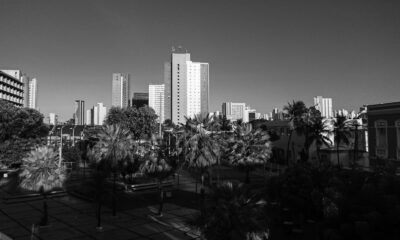
Politics
‘Urban-Rural Divide’ in the U.S. Figures Strongly in Marijuana Legalization
With some notable exceptions, marijuana legalization is limited to cities and still a great notion out in the country, where commercial marijuana activity is almost uniformly banned.
Are you an effete city slicker or a dull country bumpkin?
Almost certainly you are neither — an inconvenient truth for the sociologists, political scientists and armchair observers who increasingly point to an “urban-rural divide” clearly demarcating American society into two opposing and impossibly divided camps.
At the same time, there is increasing evidence to suggest we do live in a sharply polarized country, with sharply contrasting values and mores — and our pole of attraction may be identifiable by where we live. A recent Pew Research Poll found growing sentiment for left-leaning politics in cities, and a contrasting affinity for conservative values in rural areas.
And this divide appears to be revealing itself in the politics of marijuana legalization. There are exceptions, but simply put: If you live in a rural area where you can see the stars, you are unlikely to see a legal cannabis dispensary. If you are blanketed in artificial light, you will be able to walk through well-lit city streets to a well-lit dispensary.
This rule of thumb is present nearly everywhere cannabis is legal. In California, the majority of licensed commercial cannabis dispensaries are in coastal cities like San Diego, Los Angeles and San Francisco. In the more conservative interior, commercial cannabis activity is almost uniformly banned (although the ban also extends to inland urban areas like Fresno, where police recently claimed that cannabis edibles “could cause death.”)
Nevada is only the most recent state to present an object example of this country-city divide. Marijuana sales are booming in the state, but thanks mostly to a concentration of high-volume dispensaries in Las Vegas.
Elsewhere — and there’s a lot of “elsewhere” in a state as vast as Nevada — rural areas are “underserved,” cannabis-industry experts told the Las Vegas Review-Journal.
Elected officials in six mostly rural counties told the newspaper that they’ve either banned commercial marijuana cultivation and sales outright or have “not seen any interest” in local sales.
That tracks at least somewhat with polling from other states that shows support for marijuana legalization following the same predictable partisan lines as other issues. In Wisconsin, it’s Democrats in cities who don’t go to church powering the growing majority of all citizens who want marijuana legalized, while church-going Republicans in rural areas are more cautious.
Exact reasons for this reluctance can be hard to suss out. In California, elected and law-enforcement officials speak vaguely of unwanted elements and crime posed by legal cannabis operations.
In Nevada, rural elected officials say that the “federal ban on marijuana” leaves them disinterested in permitting commercial marijuana activity, the Review-Journal reported. (This prohibition mindset also baffles some marijuana-industry entrepreneurs, who point out that the same rural Nevada counties and towns who ban legalized marijuana permit brothels. “They are a cultural part of the community and are viewed in a positive light,” shrugged Elko City Manager Curtis Calder in an interview with the Review-Journal.)
In Michigan, the state’s medical marijuana industry is almost comically skewed to the urban — and even then, a very specific urban.
Up to 75 dispensaries will be permitted to operate in Detroit, which is one of the 103 local governments in the state to permit legal cannabis activity. Compare that to the 1,670 other townships, villages, and other cities that have not agreed to allow medical marijuana businesses to operate, according to the Detroit Free Press.
The practical effect of this urban-rural cannabis divide is difficult or nonexistent access to legal, lab-tested cannabis for country-dwelling cannabis users, who have little option beyond a long drive into town or patronizing the illicit market. And for the urbanites, whose municipal budgets swell with cannabis-tax dollars, who see crime drop in areas where dispensaries operate, and who can select from hundreds of cannabis products — or choose not to select at all, if they please? They get all the benefits and none of the drawbacks. And that is unfair.
TELL US, do you live in an urban area or a rural area? What are your experiences securing cannabis?






















